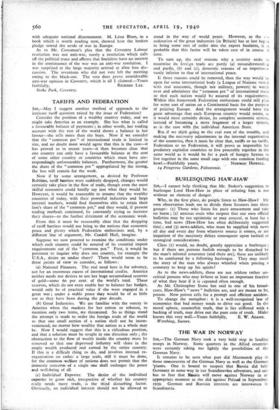TARIFFS AND FEDERATION
SIR,—May I suggest another method of approach to the intricate tariff question raised by the issue of Federation?
Consider the position of a wealthy country today, and we might take America as an example. She has what is called a favourable balande of payments; in other words, her trading account with the rest of the world shows a balance in her favour—she sells more than she buys. Now if we consider that the " common pot " of international trade is limited in size, and no doubt most would agree that this is the case—it has proved so in recent years—it then becomes clear that one country can only have a favourable balance at the cost of some other country or countries which must have cor- respondingly unfavourable balances. Furthermore,' the greater the share of the " common pot " appropriated by the strong,
the less will remain for the weak. - Now if by some arrangement, as desired by Professor Robbins, tariff harriers were suddenly dropped, changes would certainly take place in the flow of trade, though even the most skilful economist could hardly say just what they would be. However, it would' be reasonable to assume that the wealthy countries of today, with their powerful industries and large internal markets, would find themselves able to retain their lion's share of the " common pot," and they would, if present trading methods continued, be constantly trying to increase their shares—to the further detriment of the economic weak.
From this it must be reasonably "clear that the dropping of tariff harriers would not bring to the nations that economic peace and plenty which Federation enthusiasts and, by a different line of argument, Mr. Cordell Hull, imagine.
Suppose we now proceed to examine the conditions under which each country could be assured of its essential import requirements out of the '" common Pot." First, it would be pertinent to inquire why does one country, for example the U.S.A., desire an undue share? There would seem to be three points of view to consider, as follows: (a) National Finances. The real need here is for solvency, not for an enormous excess of international credits. America neither needs nor desires to use her huge accumulated reserves of gold—some 6o per cent. of the world's total. These reserves, which do not even enable her to balance her budget, would only be of practical value if she were engaged in a great war ; under a stable peace they would be of as little use as they have been during the past decade.
(b) Great Industries. We are familiar with the outcry in America when the markets for her cotton or tobacco, to mention only. two items, ere threatened. So as things stand the attempt is made to order the foreign trade of the world so that one small section of a nation shall not be incon- venienced, no matter how wealthy that nation as a whole may be. Now I would suggest that this is a ridiculous position, and that a solution must be sought in one direction only ; the obstruction to the flow of wealth inside the country must be removed so that one depressed industry will share in the ample wealth produced and earned by the entire country. If this is a difficult thing to do, and involves internal re- organisation on rather a large scale, still it must be done, for the cominon utelfare of nations does not permit that the domestic" concerns 'of a single one shall endanger the peace and well-being of all.
(c) Individual Exporter. The desire of the individual enparter to grow rich, irrespective of whether his country really needs more trade, is the third disturbing factor. Obviously, an individual interest should not be allowed to
stand in the way of world peace. However, as the co- ordination of the great -industries (in Britain) has at last begun to -bring some sort of order..into. the export business, it is probable that this factor will be taken care of in course if time.
To sum up, the real reasons why a country seeks to maximise its foreign trade are partly (a) misunderstanding and partly, (b) and (c), domestic reasons of an importanze vastly inferior to that of international peace.
If those reasons could be removed, then the way would be open for some international body (a League of Nations vested with real economic, though not military, powers) to watch over and administer the ,"common pot " of international trade so that each nation would be assured of its requirements. Within this framework Federation enthusiasts could still plan for some sort of, union on a,Continental basis for the purpose of policing Europe. And the• arrangement would have the great advantage that each . European country would retain, as it would most certainly desire, its complete economic system, instead. of becoming mere . fragment of a larger system, as ,is. the case with the individual American State.
But.,if we shirk gollig to the real root of. the trouble, and making the- necessary adjustments in the internal organisation of the countries,' then it must be clear that, tariffs or no tariffs, Federation or no Federation, it will prove as impossible .for predatory capitalist countries to live peaceably together in the same world as it would be for a, pack .of -'hungry_ hyenas to live together in the same small cage with one common feeding










































 Previous page
Previous page